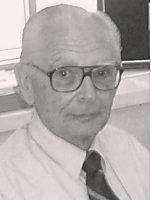|
 Recognition for significant work in research, using and teaching Elliott Jaques' concept Recognition for significant work in research, using and teaching Elliott Jaques' concept
 Collaborated in studies on the general staff of the US Army 19XX to 19XX Collaborated in studies on the general staff of the US Army 19XX to 19XX
 Developed an academic network to research the methods and sponsored conference and publications edited by Jerry G. Hunt Developed an academic network to research the methods and sponsored conference and publications edited by Jerry G. Hunt
 Conducted research studies related to the theory: LIST Conducted research studies related to the theory: LIST
 Wrote with Elliott Jaques, Executive Leadership: A Chapter from the Handbook of Military Psychology Wrote with Elliott Jaques, Executive Leadership: A Chapter from the Handbook of Military Psychology
 Wrote with members of the ICAF staff, Strategic Leadership: The Competitive Edge, a leadership text in current use at ICAF Wrote with members of the ICAF staff, Strategic Leadership: The Competitive Edge, a leadership text in current use at ICAF
Contributions to the Global Organization Design Society:
 Wrote with Stephen D. Clement, Contributions of Stratified Systems Theory to Military Leader Development and Organization Redesign in the US Army, in Organization Design, Levels of Work and Levels of Human Capability - link Wrote with Stephen D. Clement, Contributions of Stratified Systems Theory to Military Leader Development and Organization Redesign in the US Army, in Organization Design, Levels of Work and Levels of Human Capability - link
 Attended 2007 GO Society world conference in Toronto Attended 2007 GO Society world conference in Toronto
 Provided video interview of his experience with requisite concepts - link Provided video interview of his experience with requisite concepts - link
 Served on GO Society Editorial Board 20XX ongoing Served on GO Society Editorial Board 20XX ongoing
 Led team review of Otto Laske's book Led team review of Otto Laske's book
Recognition by the Global Organization Design Society:
 Senior Fellow of the Society Senior Fellow of the Society
 Appointed by GO Board to the GO Advisory Council. Appointed by GO Board to the GO Advisory Council.
 Name by GO Board to the GO Society Academic Honour Role. Name by GO Board to the GO Society Academic Honour Role.
 Invited by the GO Board to the Organization Design Summit, October 2010 to set future directions for the field. Invited by the GO Board to the Organization Design Summit, October 2010 to set future directions for the field.
Biography:
Dr. Jacobs is currently the Institute of Complexity Management Director of Research and Development, and co-founder and principal of Executive Development Associates. From 1995 to 2005, he held the Leo Cherne Distinguished Visiting Professor of Behavioral Science Chair at the Industrial College of the Armed Forces, National Defense University. There, he taught courses in Strategic Leadership, and Creative and Critical Thinking. He also created and directed the College's Executive Assessment and Development Program.
From 1974 to 2005, Dr. Jacobs served in a series of assignments with the U. S. Army Research Institute for the Behavioral and Social Sciences, where he completed landmark research on strategic performance requirements and the developmental processes required to produce strategic leadership skills. With Jaques, he developed an adaptation of Jaques' requisite organization structure that specifies (a) critical performance requirements at the various levels of a requisitely structured organization, and (b) the critical cognitive skills which must develop over time to enable successful perfor-mance. The structure identifies developmental targets over time and constitutes a theory-based template for development of leadership within large-scale organizations. The conceptual base for this structure has been widely adopted by the military senior service colleges.
Dr. Jacobs received the B.A. and M.A. degrees from Vanderbilt University, and the Ph.D. from the University of Pittsburgh. He is the author of Leadership and Exchange in Formal Organizations, and Strategic Leadership: The Competitive Edge. His most significant recent publication was as leadership section editor and chapter contributor (with Jaques) in Handbook of Military Psychology. He was the year 2000 recipient of the John C. Flanagan Lifetime Achievement Award from the American Psychological Association Division of Military Psychology, and is a Fellow of both the American Psychological Association and the American Psychological Society.
Academic Degrees and Professional Certifications:
 B.A. - Vanderbilt University, United States B.A. - Vanderbilt University, United States
 M.A. - Vanderbilt University, United States M.A. - Vanderbilt University, United States
 Ph.D. - University of Pittsburgh, United States Ph.D. - University of Pittsburgh, United States
Articles:
 Jacobs, Owen, 1987, “Implications of Current Organizational Theory for Executive Selection and Development,” PTC/MW Newsletter, XI(4), April 1987. T. Owen Jacobs. Talk presented to Personnel Testing Council of Metropolitan Washington on April 8, 1987. Jacobs, Owen, 1987, “Implications of Current Organizational Theory for Executive Selection and Development,” PTC/MW Newsletter, XI(4), April 1987. T. Owen Jacobs. Talk presented to Personnel Testing Council of Metropolitan Washington on April 8, 1987.
 Measuring Hidden Dimensions of Human Systems- A review June 03, 2010 T. Owen Jacobs Measuring Hidden Dimensions of Human Systems- A review June 03, 2010 T. Owen Jacobs
 Military Applications of Stratified Systems. 14p. Military Applications of Stratified Systems. 14p.
Books:
Videos:
Date: 2006
Duration: 11:01
Date: 2006
Duration: 7:27
Date: 2006
Duration: 4:57
Date: 2006
Duration: 7:48
Date: 2007
Duration: 11:00
Date: 2006
Duration: 3:46
Letters of Appreciation
|
 . Owen Jacobs
. Owen Jacobs




